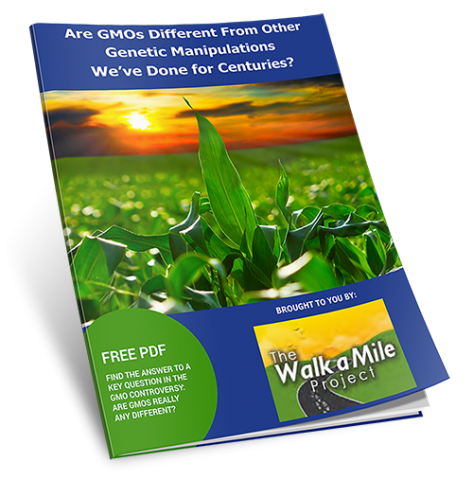Can You Find the Truth on GMOs If the Truth’s Been Paid For?
Much of the skepticism surrounding the GMO debate stems from a TRUST problem. It’s a big part of the reason why The Walk a Mile Project chose the GMO situation as the subject matter for its first documentary, because finding an unbiased, honest source is not an easy task within this controversy, yet the topic itself is of crucial importance to humanity.
But dig around for just a few minutes online, and you’ll easily find polarizing and questionable sources of “information” on both sides of the GMO controversy. As a recent article at the Columbia Journalism Review (CJR) laments, ethics among science writers is a serious concern right now. The piece even references GMOs, Monsanto, and Kevin Folta, the man who’s become the poster child of late for non-disclosure.
Indeed, at the very end of the piece, Gary Schwitzer, Publisher of HealthNewsReview.org, had this to say about the current state of science journalism —
“It’s often a sad state of affairs, the blind – or willfully blind (journalists) – leading the blind (news consumers).”
GMO ETHICAL ISSUES
EcoWatch recently referenced the CJR article, voicing their concern specifically on the GMO front, and how sources who speak out supporting GMOs are sometimes funded by big companies such as Monsanto. Again, we’ve seen an erosion of trust, as time and time again we hear “independent professionals” talk about GMO safety in our food supply… but an increasing number of listeners only smirk or raise their eyebrows in response.

Funding disclosures are “key” to the truth
Here’s what EcoWatch reported —
U.S. Right to Know reviewed 27 articles quoting (or authored by) university professors after they received Monsanto funding, but without disclosing that funding. See list of 27 articles here.
Many of these journalistic failures occurred at influential news outlets: newspapers such as the New York Times; science publications such as Science Insider; magazines such as the New Yorker; as well as broadcast outlets like NPR.
And it’s difficult to understate the damage that this lack of ethics can inflict on the conversation. When readers are swayed by sources who skew the truth in their favor, thanks to a financial stake in the matter, we’re failing each other —
This is a collapse of journalistic standards. When reporters quote sources about food issues such as GMOs or organic food, readers deserve to know if the sources have been funded by Monsanto or have other conflicts of interest.
The principal effect of failing to reveal these conflicts of interest is to unfairly enhance the credibility of Monsanto-funded academics and their support of GMOs and criticism of organic food, while detracting from the credibility of consumer advocates.
What’s the solution to this misrepresentation? As documentary filmmaker and podcaster (and fellow GCB writer) Eric Battersby puts it —
“We need to actively seek the truth from the start. First, ‘experts’ need to disclose funding, and they need to do so upfront, not in some tiny footnote at the bottom of an article. Second, journalists should point blank ask sources if they receive any funding that might result in a conflict of interest, and should do so before even engaging in conversation. Why? Because knowing where a source may exhibit bias can help the journalist ask the right questions in the first place, tailoring their interview to focus on finding the truth.”
Still, that may not be enough, as there’s always the possibility that the interviewee will simply decline to disclose such funding. Now more than ever, we need to check our sources and uncover the ties that may be swaying “professional” opinion.
To read the Eco Watch article in its entirety, click here:
http://ecowatch.com/2015/11/28/sources-funded-monsanto/
For the Columbia Journalism Review article on ethics in science journalism, visit:
http://www.cjr.org/criticism/science_journalism_conflicts_of_interest.php



